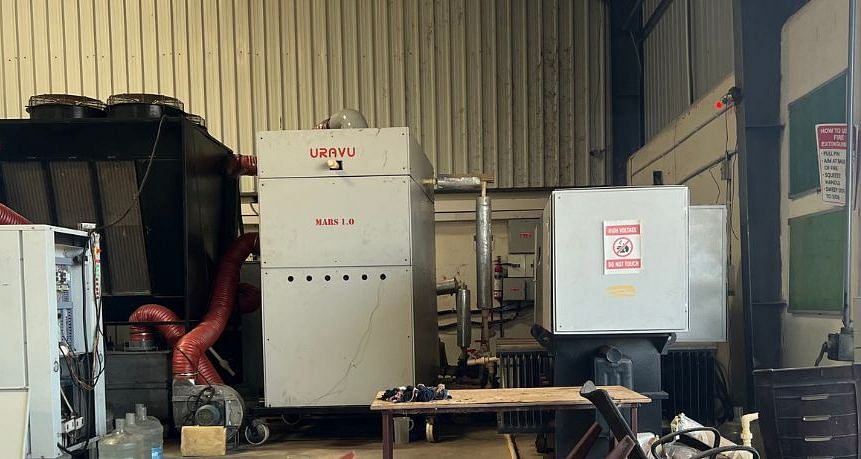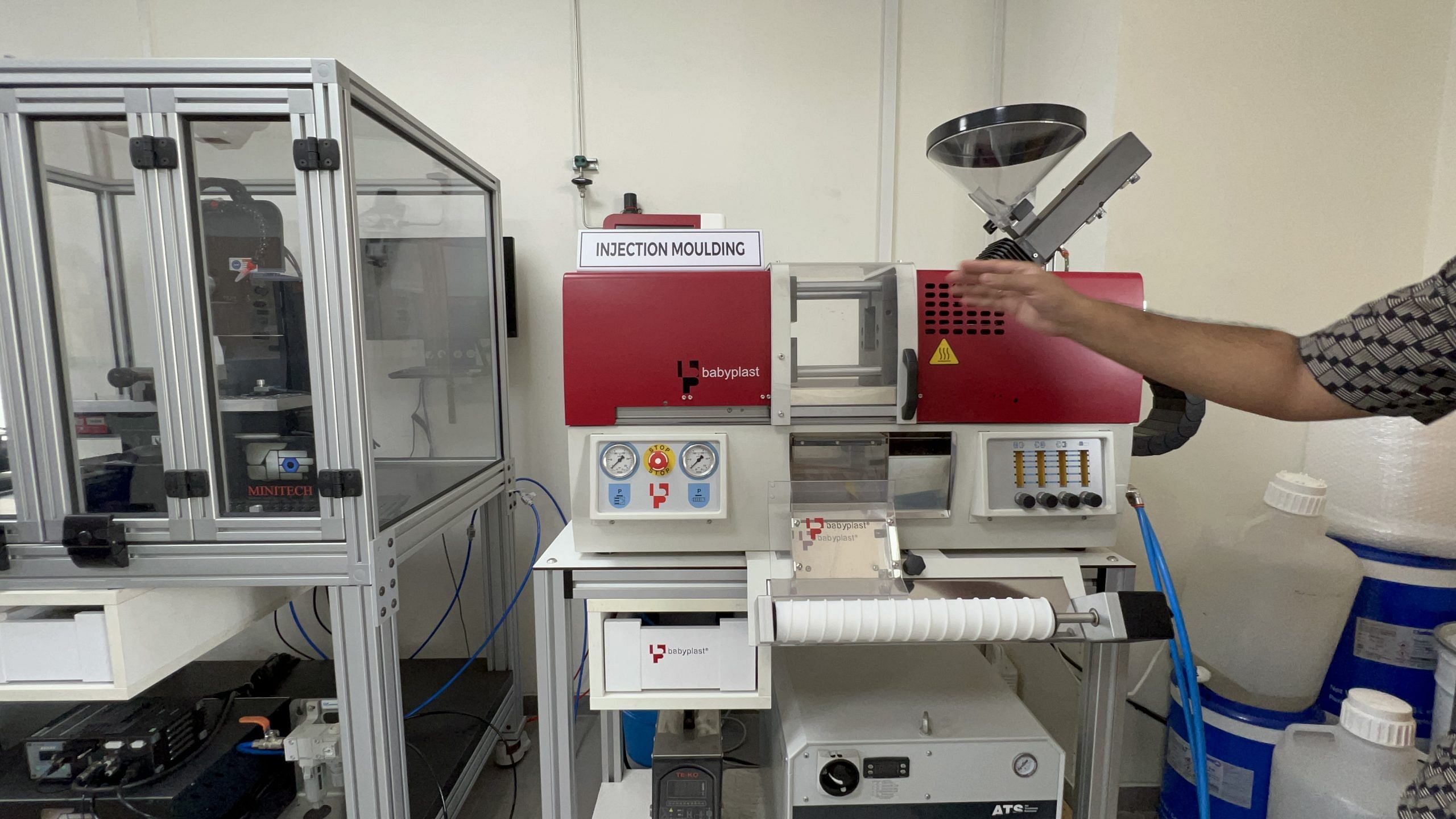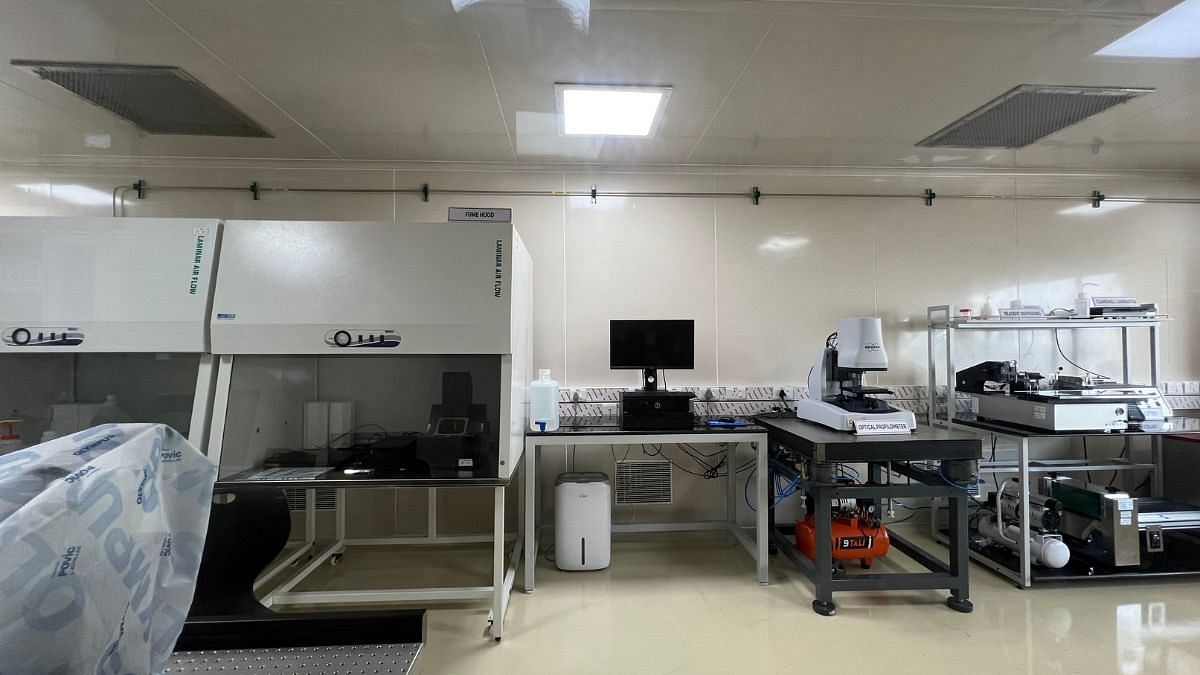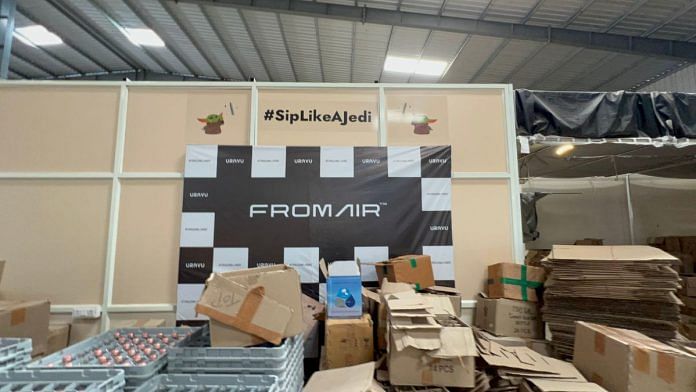Bengaluru: In Bengaluru, a clean-tech startup has made a Dune-esque science fiction idea a reality. Their machines pull water from the air. For a little over a year, the Uravu Labs plant in Hennur, with machines named ‘Tatooine’ and ‘Mars’, has been bottling this water and delivering it to hotels and restaurants in the city. And now, the startup wants to bring this technology to villages.
“We use a desiccant to absorb moisture from the air, renewable energy to convert it to high-quality water, and primarily solar, along with waste heat from industries and even biomass waste for power. It is very affordable,” says Swapnil Shrivastav, co-founder and CEO of Uravu Labs, who had a hand in naming the factory’s machines after the arid red plant in our solar system, and the fictional one in the Star Wars universe.
Uravu Labs is part of a new breed of deep tech startups that is prototyping tech for rural India. Another Bengaluru startup, Saaf Biogas, is delivering zero-emission gas made from food waste villages in Uttar Pradesh, Andhra Pradesh and Karnataka. A third, Voxelgrids Innovation, has built the first made-in-India MRI scanner. It’s battery-operated, simpler to use, and portable—at 2-3 tonnes, it weighs merely half as much as imported MRI scanners in use in India today.
These innovations are the result of the intersection of academia, entrepreneurship, and government funding.
Deep science and deep tech have connotations of big data, quantum mechanics, artificial intelligence, and other such near-futuristic ideas. But many startups also work in labs similar to those found in academic institutes, to develop new applications for technology to fulfil a need. In India, bolstered by incubators as well as funding from the government and private sectors, deep tech startups are also developing biomedical devices, sustainable eco-friendly energy and agricultural solutions.

Incubators, like the Center for Cellular and Molecular Platforms (C-CAMP) with four floors of biology labs, are powerhouses. The occupants are all entrepreneurs from various startups that C-CAMP supports by giving them access to experts, facilities, and guidance they require.
“To work in deep science and tech, we must create a full stack ecosystem, which effectively takes an innovation from, say, a lab in IIT-Madras, to a community, like farmers in UP. Incubators play a big role in that. We also build accelerators, investment engines, and deployment engines,” says Manoj Kumar, founder of the incubator Social Alpha based out of Bengaluru.
In India, bolstered by incubators as well as funding from the government and private sectors, deep tech startups are also developing biomedical devices, sustainable eco-friendly energy and agricultural solutions.
Also read: IISc deep tech startups are pushing India into elite league. Baby firms with big ambitions
Tapping the incubator network
Voxelgrids with its portable MRI machines was the very first startup to be incubated at Social Alpha, funded by the Tata Trusts’ Foundation for Innovation and Social Entrepreneurship.
“When I came back to India after studying MR physics abroad, I realised there is actually no scanner available for us to access as engineers. I wanted to build something that has a value proposition of its own,” says Voxelgrids founder-CEO Arjun Arunachalam. The lightweight MRI scanners, being tested since 2018, were certified last year. Now, these machines will roll out to healthcare facilities, starting with the Tata Cancer Foundation.
Their main source of magic is the more affordable liquid nitrogen for cooling instead of the expensive and rare liquid helium used in traditional scanners. And Social Alpha played a key role in enabling their transition from an idea to a commercial product.
Incubators like C-CAMP and Social Alpha straddle both the marketplace and academia providing startups access to both ends of the spectrum, and everything in between. They provide the infrastructure required to develop, test, and sell a new product, and help companies avail a number of grants and financial assistance.

At C-CAMP, beyond the RT-PCR machines, the protein filtration equipment, and a whole host of other very specific instruments, is the manufacturing lab. Nearly 65 companies have used this facility to make their prototypes on a 3D printer, a vacuum casting machine or an injection moulding machine, depending on quantity. A giant machine called a CNC micro-milling machine etches micro-tubes that look like tiny circuits onto biocompatible material that goes into the human body.
“We have worked with over 95 startups, 2,000 researchers, and produced 250 publications,” says Taslimarif Saiyed, CEO and director of C-CAMP.
Increasingly, people within academia are putting on their entrepreneurial hats—it’s not uncommon to see students build and roll out products to the market even before they graduate.
Incubators like C-CAMP and Social Alpha straddle both the marketplace and academia providing startups access to both ends of the spectrum, and everything in between.
Blackfrog Technologies contributed substantially to distributing Covid-19 vaccine vials through its battery-operated portable refrigerator, which is smaller than a backpack. The innovative cold storage helped save thousands of vaccine doses from going to waste and was used to deliver at least 2,00,000 doses in remote locations, especially in the northeastern states.
“We were incubated first at Manipal University, where our R&D journey began in designing and testing medical devices,” says Blackfrog founder, Mayur Shetty. After six and a half years of design, development and testing, he started tapping into the incubator network.
Blackfrog raised its first round of seed funding while incubated with Pune-based Venture Centre, an independent sub-campus hosted by CSIR-National Chemical Laboratory (NCL). Later, the startup also worked with Social Alpha and C-CAMP.

But beyond facilities lies funding.
And invariably, such startups rely on grants, a majority of which come from the central government. It has invested heavily in deep tech startups over the past eight years through the Biotechnology Industry Research Assistance Council (BIRAC)—the Department of Biotechnology’s industry-academia interface.
Also read: Bengaluru museum is making science artsy, buzzy. And it won’t stop changing
The biggest funder
Arun Janitri researched pregnancy and newborn monitoring devices for five years and worked with gynaecological and neonatal experts to understand a basic question: Why do so many mothers and babies die during childbirth?
“We discovered that the gap was the lack of monitoring critical vitals and early decision-making. With support from BIRAC, we worked on solving this problem,” he says.
In 2021, he deployed his easy-to-use pregnancy and foetal monitoring device and software, through his startup, Janitri.
Founded in 2016, the startup—which bagged Rs 1 crore from a Shark Tank India appearance—focuses on what is known as 1,000 days of pregnancy: from conception to the child reaching two years of age. The wearable devices, which monitor the vitals of both the mother and the baby, have been used in hospitals across the country, especially in tie-ups with state governments, such as those of Karnataka, Maharashtra, Rajasthan, Haryana, Bihar, Manipur, Meghalaya, and Arunachal Pradesh
Today, Janitri exports its devices to countries like Bangladesh, Sierra Leone in West Africa, and Southeast Asian nations. It all started with its first grant from BIRAC.
Nearly all startups, at some point, avail of BIRAC grants. Since its inception in 2012, it has given a leg-up to as many as 2,000 companies. These grants can be up to Rs 50 lakhs for 18 months. Over Rs 299 crore has been invested in biotech startups alone.
Startups rely on grants, a majority of which come from the central government. It has invested heavily in deep tech startups through the Biotechnology Industry Research Assistance Council (BIRAC).
“There are companies that are reviving people remotely with handheld devices or monitoring cancer patients’ vitals through their mattresses,” says Satya Dash, former founding head of strategy at BIRAC. “If there are solutions being designed for problems through deep science and deep tech, it typically has global resonance and should be able to scale up through a landscape of regulation.”
Dash says that innovation in deep science can be encouraged in two ways: a push in the form of funding or a pull in the form of market creation. Like the Department of Science and Technology, NITI Aayog and Department of Biotechnology, BIRAC’s focus is on the push for innovation. Incubators and startups are powered by the government’s strong push for the Make in India initiative.
Many companies, especially the ones that want to operate outside cities, tie up with state governments and other public agencies. Blackfrog, for instance, worked with state governments and development agencies during the Covid-19 pandemic to help them acquire refrigerators.
If there are solutions being designed for problems through deep science and deep tech, it typically has global resonance and should be able to scale up through a landscape of regulation.
– Satya Dash, former founding head of strategy at BIRAC
“Our units get integrated into the public health system across the country,” says Shetty. “The public sector is crucial to the development of deep tech in India.”
Medical devices and agri-tech
In Koramangala, Bengaluru, another incubator IKP-Eden is fitted with cutting-edge medical workshops and labs to give a leg-up to startups that are associated with life sciences, medical devices, and sometimes, agri tech.
“We were one of the earliest to start, in about 2008, and were the first to take part in the Bill and Melinda Gates Foundation Grant Challenges,” says Sridhar Ramanathan, CEO of IKP EDEN.
It’s where oncologist Dr Pawan Mehrotra developed the Poorti Kit—an affordable silicone breast prosthesis and accessories. He noticed that in many rural hospitals, breast cancer patients would sometimes come with their saris draped on the opposite shoulder. He realised they were doing it to cover up post-mastectomy and decided to work in patient rehabilitation. As managing director of the startup Aarna Biomed, he and his team developed the Poorti kit, which sells for Rs 4,000 and is in use today in 14 states including Tamil Nadu, Bihar, West Bengal, and Maharashtra. The waterproof kit comes with a pre-made external silicone breast prosthesis, two pocketed brassieres, and two prosthesis covers.
The public sector is crucial to the development of deep tech in India.
– Mayur Shetty, founder, Blackfrog
Climate and sustainability are other areas where companies are innovating at a very fast pace, mainly in exploring alternative sources of energy.
“Our biogas grid in a village near Varanasi is the first biogas one in India and one of the largest power grids,” says Harshad Kulkarni, CEO & co-founder of Saaf Biogas. The company has won green awards for their pioneering ‘clean cooking’ community network, and like most other deep tech companies, has been recognised and supported by the government.
The blink-and-miss pace of tech innovation has been recognised by incubators, who are themselves rapidly evolving to keep up with it.

“One of our USPs is that we do spinoff technologies from national labs. We have about 11 companies that are spin-offs of parent companies or research from national CSIR labs,” says Premanth Venugopalan who heads Venture Centre and is also the chief scientist at NCL.
Also read: Indian science communicators are fighting for freedom from jargon. Scientists push back
The rare success story
Behind every success story, there are a hundred failures. In deep tech, the turnaround time is so high that the entire market sometimes changes before a prototype is developed. Nascent companies can take several years to achieve positive cash flow.
“In the West, good ideas and students come out of academia and collaborate with professors to build expertise and go from there. In India it’s the other way around; the government and academia were reactive to young people proactively coming through with solutions for difficult problems instead of building systems from the ground up,” says Voxelgrids’ Arunanachalam.
The long-term requirement of funds continues to be the biggest challenge for the deep tech ecosystem in India. This is complicated by the fact that businesses tend to work in silos, just like academia does, leaving the incubators to suffer.
Unlike startups in a market like the US that attracts private investors, Indian companies like us have to first sell to the government and CSR, who take years to buy and test products
– Swapnil Shrivastav, co-founder and CEO of Uravu Labs
Uravu Labs is one of the success stories. For the last 15 months, through solar-powered machines like Tatooine, it has been filling 2,000-litre tanks with clear water pulled from air. The stored water gets bottled and delivered to hotels and restaurants in the city, customers have no idea that they are drinking water of such pure quality that minerals have to be added back into it to stick to WHO guidelines.
In the entire process, there is minimum wastage of heat—the machines have been built specifically to reuse a separate flow of water by cycling it through evaporation and condensation repeatedly. The source of energy for the machines is mostly solar, but occasionally waste heat from industries or biomass waste is also used.
Uravu’s water bottles are bought by businesses for Rs 4 per litre. Co-founder Shrivastav wants to make this affordable technology ubiquitous, especially in villages.
Back in 2017 when they were starting out, the Uravu team was confident they would progress and scale up quickly, but it was still a struggle.

“Unlike startups in a market like the US that attracts private investors, Indian companies like us have to first sell to the government and CSR, who take years to buy and test products,” says Shrivastav. “In the face of increasing droughts, heatwaves, and water table depletion, we need to be proactive instead of reactive towards deep tech.”
(Edited by Theres Sudeep)



